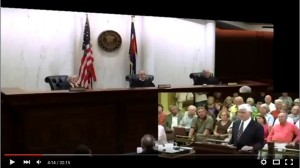School sits on former open space that activists want back — eventually
School sits on former open space that activists want back — eventually
Attorney and parks advocates press case at Court of Appeals to overturn land swap involving Hampden Heights Open Space
By Jon Murray
The Denver Post
Two years after the Denver City Council cleared the way for a controversial land swap, children filed last month into a new elementary school built on former city-owned open space near Cherry Creek Reservoir.
But the Joe Shoemaker School’s opening hasn’t ended a legal fight by still-simmering Denver parks advocates over what they saw as an illegal giveaway of valuable park land, a charge disputed by city officials.
Dozens of the lawsuit’s supporters packed a Colorado Court of Appeals courtroom this month as their lawyer, who is appealing an earlier loss in Denver District Court, again pressed to return the land to city ownership.
That prospect has been complicated, of course, by Denver Public Schools’ construction of the building on the 11½-acre city parcel on Havana Street, which was swapped by the city for a central Denver former DPS administration building that soon will become a domestic violence resource center.
The opponents admit that if they prevail, their best-case scenario would be to win a court order for the land to be returned as city park land — but only decades from now, once the new school has outlived its usefulness.
Attorney John Case, who lives nearby, and other park advocates say they’re still fighting to protect more than just one park.
“Because the city and county of Denver, in my mind, did a blatant end run around the law and stole the land from the people without putting it to a vote,” said Zelda Hawkins, a plaintiff who has lived nearby for 20 years. “They built the school in a flood plain, even though they insist it’s not. And it was a smoke-filled backroom deal.”
She and others fear the city could target other open space owned by the Department of Parks and Recreation for development.
Most of the new school’s site had been part of the Hampden Heights Open Space, abutting Paul A. Hentzell Park.
City attorneys argue that since the land had never been designated as a park, the city charter’s requirement for a citywide vote to sell it didn’t apply. The deal with DPS has been controversial from the start.
A parks advisory board voted 11-6 against dropping the open space designation, a recommendation that then-Parks and Rec manager Lauri Dannemiller overruled in early 2013, backed by Mayor Michael Hancock.
Dannemiller said at the time that the city acquired park land elsewhere, mitigating the loss. And she viewed the land swap as meeting “critical, community-wide needs for a new school in a severely overcrowded area of the city” as well as for a domestic-violence resource center in central Denver.
The Rose Andom Center, at 1330 Fox St., is now being renovated as backers work to raise the final $740,000 for the $12.2 million project. It will function as a service center where domestic violence victims can access help from nonprofit groups and criminal justice agencies under one roof.
After the council signed off in April 2013, the opponents didn’t give up, first attempting to launch a voter referendum to undo the deal and then turning to the courts.
Facing pointed questions from a three-judge panel on Sept. 1, Case argued legal points that included the effect of the city’s 2010 rezoning, which identified areas including the school land as open space; recurring use of the land for recreation back before the 1950s; and references to it on city documents.
The city charter says the city can’t sell or lease park land without a vote of the people if it was recognized as a park before 1956 or was designated by ordinance after that.
Last year, Denver District Court Judge Herbert Stern ruled that the open space met neither of those criteria.
Assistant city attorney David Broadwell told the appeals judges: “We have never disputed factually that people may have been out there informally using the land — and a lot of the land along Cherry Creek — in the mid-1950s and before, for itinerant recreational activities. No dispute about that at all.”
But he argued that Case had failed to identify any official action before the 1950s that designated the area as park land.
Chief Judge Alan Loeb ended the hearing by pressing Case on what he wants from the court, given the school’s opening.
A strong precedent, Case suggested.
“This isn’t about today or tomorrow — it’s about 40 years from now,” Case said, “when parks land is even more scarce for an increasing population than it is today.”
The appeals court could issue its ruling in coming weeks.
![]()




Comments
School sits on former open space that activists want back — eventually — No Comments
HTML tags allowed in your comment: <a href="" title=""> <abbr title=""> <acronym title=""> <b> <blockquote cite=""> <cite> <code> <del datetime=""> <em> <i> <q cite=""> <s> <strike> <strong>